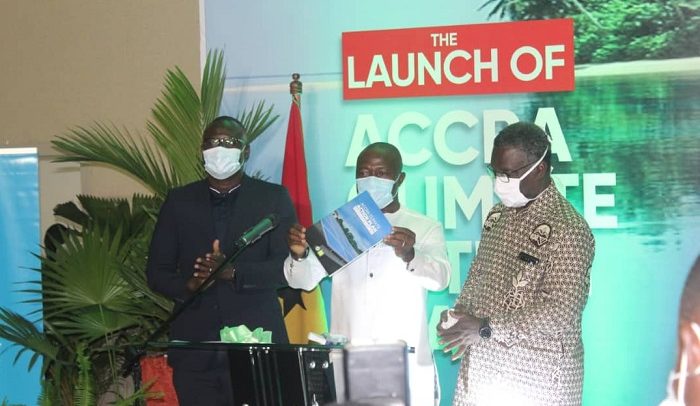Mohammed Nii Adjei Sowah, (middle) with the climate action plan.
The Accra Metropolitan Assembly (AMA) has launched a climate action plan to reduce carbon emissions by 27 percent below Business-As-Usual (BAU) by 2030.
The plan sets out a series of priority actions to be implemented between 2020 and 2025 which will set the city on a pathway towards resilient and sustainable development in 2050.
It will also identify the most important focus areas for policy makers, planners, citizens, business owners and entrepreneurs to adapt to changes to further reduce carbon emissions by 46 per cent by 2040 and attain a total reduction of 73 per cent of BAU scenario by 2050.
The focus areas include waste and waste water, energy, buildings and industry, transportation, land use and spatial planning.
Mayor of Accra, Mohammed Nii Adjei Sowah, speaking at the launch, said the 2015 baseline greenhouse gas profile modeled to 2050 and accounting for changes in population and economic growth indicates that by 2050 if authorities do not act now, Accra would be emitting over 9 million tonnes of carbon dioxide equivalent.
“Climate change is no longer a debatable subject and for us in Accra we know it too well. The shadows of past floods and prospects of flooding whenever there are heavy rains have not escaped us. It is interesting to note that even tough average rainfall in Accra has reduced by 2.4% since 1960, the rate of flooding has rather increased,” he added.
He thus noted that in line with the concerns and as a means of thinking global whilst acting local, the City intensified its engagement with the C40 Climate Leadership Group which required Accra to develop a Climate Action Plan to put the city on a path to carbon neutrality by 2050 and contribute to restricting global temperature rise to below 1.5oC (A Paris Agreement Compliant Plan) by the end of this year 2020.
Mr. Sowah said the priority actions for the first five years were identified by comprehensively reviewing existing national regional and AMA-level policies and plans, using scenario modeling for evidence-based decision making and obtaining key stakeholder input to directly link actions to immediate needs.
Minister of Environment, Science and Technology and Innovation, Prof. Frimpong-Boateng, said the launch of the climate action plan pointed to the strong alignment with national efforts and proof that climate actions are being domesticated into both local and national plans.
He said the government has introduced major policy interventions and initiatives including the plastics waste management policy.
“These initiatives are already contributing positive results to the attainment of the sustainment development goals, resilient and low-carbon development objective,” he said.
By Jamila Akweley Okertchiri


